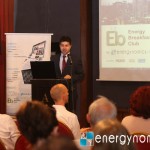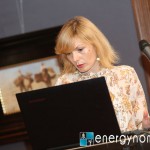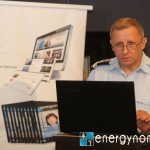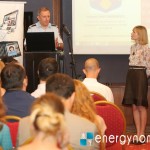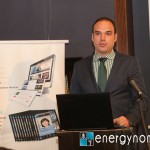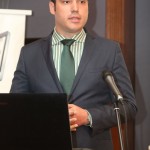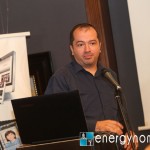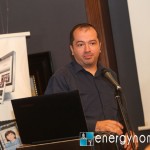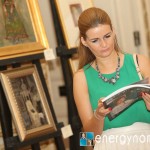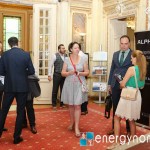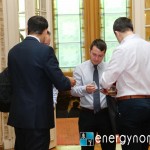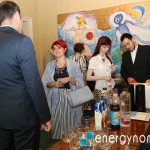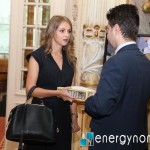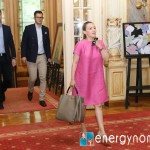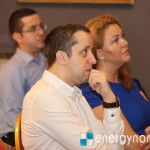On Wednesday, July 13th, energynomics.ro held the second Energy Breakfast Club this year, during which buildings were discussed. If during the first, the big picture was sketched – of the smart city – this time we laid emphasis upon the operating component and the safe exploitation and efficiency of the residential buildings and offices.
Colonel Dan Simionescu – Head of the Prevention Department at the General Inspectorate for Emergency Situations (IGSU) presented the official position of the institution regarding the emergency situations, especially in terms of fire prevention in buildings. Silviu Bulzan, Key Account Manager at Philips Lighting and responsible for the office and industrial area sectors of Central and Eastern Europe, expounded the concept of “Connecting Lighting”, a concept developed by the company and successfully implemented in the office building The Edge, from Amsterdam. The overview upon the safety and efficiency of operation was given by architect Florin Enache, member of the Order of Architects from Romania and coordinator of the working group for fire prevention, who explained the conditions that must be met by any future building based on Norm P118 / 2016 which is expected to enter into force from January 1st, 2017.
The discussion was opened by Colonel Dan Simionescu, Head of the Prevention Department within IGSU (under the administration of the Ministry of Interior), who informed us about the role of IGSU and the inspectorate’s subunits regarding community protection and of the material goods.
Colonel Dan Simionescu: The inspectorates can provide technical assistance in the steps leading to the building itself
“IGSU and the Bucharest-Ilfov county inspectorates are deeply involved Institutions in the virtue of the statutory powers, in the national, European and global intercession, regarding the protection of human communities, cultural values, archives, heritage, material goods, but also the environment. In the equation of protection the human and the material goods, the main duties of the inspectorate are aimed at drafting regulations concerning fire protection – and civil – control prevention, security endorsement (fire), market surveillance of products / equipment fixed fire prevention means technical fire safety and conduct national information campaigns preventive”, Dan Simionescu informed us. The IGSU official explained that the powers of supervision to prevent, the approval and the authorization on fire safety and civil protection preparedness of population and authorities to coordinate activities of voluntary and the private emergency auditing and the supervision of authorized persons to activities in the field of fire protection, are the responsibility of the county inspectorates.
“The fire security of a building is closely related to the design and the execution of business and the facilities that equip it, the quality of the building materials, the existence and proper functioning of fire protection systems, the heat load, the activities performed inside, but not least the education level of the people in the field of fire protection. Regulatory developments in the field of fire protection have always been influenced by the incidents. Recently, along with the substantial increase in fines, the sanctioning with the shut down of the operation or use of construction method was introduced, due to serious breach of the requirements of fire safety of the public buildings (offices, establishments of tourists, catering establishments public and recreational objectives of trade, health, religious, maintenance and repair workshops, temporary facilities indoors and temporary),” said Dan Simionescu. Also recently approved was the government decision which establishes the categories of constructions and developments that are subject to authorization and / or approval regarding fire safety, which would repeal the legislation in place, GD no. 1739/2006.
“I appreciate the productive settlement at the same table with representatives with role regarding regulation and control, professionals who contribute the design, realization and operation of buildings, those providing solutions and materials and those involved in the maintenance of buildings. We expect a contribution and support during periods including the legal documents regarding the incidence of our insitutions subject decizonale transparency” concluded Colonel Dan Simonescu.
After The Edge – Amsterdam, Philips Lighting is working on a pilot building project of the future for Romania
In his presentation Silviu Bulzan, Key Account Manager at Philips Lighting explained the history of the office buildings and the demands of user comfort. “Thomas Friedman looked at the state of globalization in which we are now – 3.0 – centered around the individual and translated upon the point that everyone has something to say in the community in which they work and live. The Concept of Connected Lighting is based on this analysis and IoT (Internet of Things), so all things are connected; the luminaires are sensors that capture information that improve quality of life,” said Silviu Bulzan. The implementation of this solution is both beneficial to the occupants (concerned to have access to systems that enhance comfort and be able to customize the space in which it operates) and investors, which give the building more quickly into companies willing to provide comfort and wellbeing of their employees. The most relevant example of this is The Edge building in Amsterdam, the lighting system incorporates sensors for motion, temperature, light and infrared.
The incorporation of the Connected Lighting system and the efficient operation of this building have generated a 60% decrease in cost of electricity, but also cost of only 42 euros / sqm / year for managing and operating the building. On the market in Romania there has been a growing interest towards implementing these solutions, and Philips Lighting is currently underway – as a concept – an office building that is part of an overall ensemble, this first test-building will be finalized in 2018.
DOWNLOAD THE PRESENTATION OF SILVIU BULZAN —> Connected Lighting for Office
Architect Florin Enache: From January 1, 2017 will come into force new Standard P 118
The architect Florin Enache, member of the Order of Architects from Romania and coordinator of the Working Group on Protection against Fire, explained the challenges encountered in designing safe and efficient buildings in the context of society and legislation. “Several years ago the need of amending the fire safety normative (P118 / 1999), in which each component – construction, installation and signaling – were unrevised from different years, respectively in 1999, 2013 and 2015, and two of them do not follow the same rules.” “The normative P118 / 1999, will be updated through a draft normative (P118 / 2016), currently under development, with the timeframe for entry into force on January 1st, 2017. Currently, we are in the consulting, advisory and correlation phase. The notable change brought by the new legislation is about changing the risk classes regarding fire safety in the sense that constructions that are under the old legislation are under Category IV of risk, following a reevaluation, in the new legislation they will be placed in the Class II of risk and therefore will not be able to receive the authorization from IGSU “said Florin Enache.
Florin Enache presented all the basic requirements for obtaining the construction quality, mandatory throughout the existence of buildings:
- Mechanical resistance and stability
- Fire safety
- Hygiene, health and environment
- Safety and operational accesibility
- Protection against noise
- Energy saving and thermal insulation
- Sustainable use of natural resources
DOWNLOAD THE PRESENTATION OF ARCHITECT FLORIN ENACHE —> Legislatie Solutii pentru siguranta cladirilor
Networking Gallery
Over 45 experts, representatives participated and attended the presentations from:
The event was organized by energynomics.ro and supported by our partners: Philips Lighting, Alpha Cab, RIDGID and SGS Romania.
Participation
In 2016, energynomics.ro aims to organize at least five more editions of the Energy Breakfast Club. The timetable and the proposed topics can be accessed here.
Participation in Energy Breakfast Club is open to all professionals in the Romanian energy industry and related sectors, based on personalized invitation launched by energynomics.ro. You can write to [email protected] to request an invitation!
Energy Breakfast Club is a meeting of 2-3 hours where energy specialists are updated with the latest information and most influential views on one of the hot topics of the moment.
From the position of host, starting at 9:00 a.m., energynomics.ro provides the moderator and coffee, the proposed theme and launches invitations to speakers. They are selected from the best knowledge of the topic and become responsible for organizing ideas and intellectual challenges. The presentations are not exceeding 20 minutes and want to be starting points for a dynamic exchange of ideas and perspectives.
The club closes at 1:00 p.m.
TAGS Philips Lighting lighting Connecting SGS Romania Florin Enache Ridgid IGSU Colonel Dan Simionescu Safety Building

